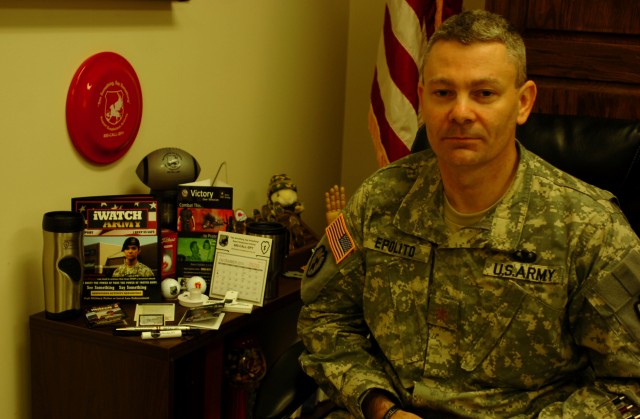
"It is very easy to know that when Soldiers deploy bad guys are out to get them. When they come back to a garrison environment they let their guard down," said Maj. William J. Epolito, chief Chemical Biological Radiological Nuclear High Explosive/Antiterrorism, 25th Infantry Division.
This month, the 25th Infantry Division commemorates the first annual Army wide Antiterrorism Awareness Month establishing a period time for both service members and civilians to focus on raising awareness for antiterrorism.
"Even though it is not the same threat level, Soldiers and family members are still susceptible to terrorist attacks. That is why this month is dedicated to raise antiterrorism awareness," said Epolito.
The focus of the Antiterrorism Awareness Month is to raise awareness, to provide training to Soldiers and family members, plan for events and ensure people take to account the risks and then mitigate those risks, and finally, conduct vulnerability assessments to ensure key facilities and personnel are properly protected.
"We are working on awareness campaign to reach family members and Soldiers using a wide variety of avenues such as prints, media, and promotional items that support antiterrorism throughout 25th Infantry Division," said Frank Diaz, antiterrorism specialist, 25th Inf. Div.
There are many levels and types of antiterrorism trainings and materials available for Soldiers and family members to educate and inform them to the different types of threats, as well as how to identify terrorist threats, how to protect themselves from those threats, and how and where to report those threats to the authorities.
According to the Department of the Army, there are four levels of training for Soldiers. Level I training is a yearly mandatory training that every Soldier has to complete on line or in person by someone who is level II qualified. Level I training gives Soldiers scenarios of terrorist events and
what people have done to prevent or become susceptible, what should they do if they find
themselves in certain situations, and more importantly how can Soldiers prevent themselves of being a victim of a terrorist.
Level II through level IV is advanced training for Soldiers and officers who are appointed to a battalion level or higher.
Terrorism has a few similarities to a criminal treat. "We can protect ourselves and stop terrorism by identifying and reporting someone trying to break into base or any facility, taking notes or recording something they should not have, or suspicious person who should not be anywhere on base or outside of base," said Epolito.
"I think the greatest weapon that we have against terrorism is identifying suspicious activities and reporting it," said Diaz.
Another way people can protect themselves is guarding their personal or military information from public access.
"While the likelihood of a terrorist attack in Hawaii is small, it does not mean someone is not trying or thinking about it," said Epolito. "It is always better to be ready and make ourselves less of a target".
Epolito explained that terrorist will take the easiest way they can to attack. The more they know about the Soldier's mission, security of base, or when and where that person is going to be at a certain moment makes it easier for terrorist to get to him or her.
"People should be alert and more vigilant about their daily activities, be watchful of anything that looks very suspicious, and report the suspicious activity to the appropriate agency like 911 or military police," said Sgt. 1st Class Dawn Robinson, CBRNE/AT, 25th Inf. Div.

Social Sharing